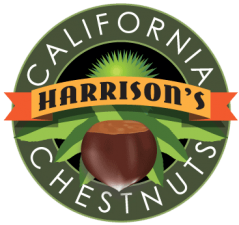Chestnut FAQs
Welcome to our Chestnuts FAQ page, where we address some common questions about our chestnuts and how to enjoy them. If you have a question that's not covered here, please feel free to reach out to us directly.
Collapsible content
What are chestnuts?
Chestnuts are the edible seeds of the chestnut tree, scientifically known as Castanea. They are a type of nut that is distinct from other tree nuts like almonds, walnuts, and pecans. Chestnuts are characterized by their sweet and earthy flavor and have a starchy, potato-like texture when cooked. They are commonly used in various culinary dishes, both sweet and savory, and are a popular ingredient in many cuisines around the world.
Chestnuts have a rich history and have been a staple food source in many cultures for centuries. They can be roasted, boiled, pureed, or used as an ingredient in stuffing, soups, desserts, and more. These nuts are also known for their nutritional value, as they are a good source of complex carbohydrates, fiber, vitamins, and minerals.
Chestnuts are often associated with the holiday season, especially in Europe and North America, where roasted chestnuts are a popular winter treat. They come in different varieties, with variations in taste and texture, making them a versatile and flavorful ingredient in a wide range of dishes.
How do I store chestnuts?
To maintain their freshness, store chestnuts in a well-ventilated bag or container in the coldest section of your refrigerator. Ideal storage conditions are between 33-35 degrees Fahrenheit with high humidity near 90%. See Storage Instructions.
Can I freeze Chestnuts?
Yes, you can freeze chestnuts for long-term storage. Place uncooked chestnuts in a plastic ziplock bag, squeeze out the air, seal it, and freeze. When ready to use, thaw them in the refrigerator overnight and proceed with your recipe. Please note that these frozen raw chestnuts should be used promptly once thawed. See Storing Instructions.
Are chestnuts perishable?
Yes, chestnuts are perishable and should be treated like fruits or vegetables. They require refrigeration. Store them in a breathable bag in the coldest part of the refrigerator. Fresh chestnuts are best consumed within two weeks of purchase. You can also freeze prepared (cooked and peeled) chestnuts or fresh chestnuts in the shell. To thaw frozen chestnuts in the shell, place them in the refrigerator overnight, then cook and consume the following day. See Storing Instructions.
What does a chestnut taste like?
If you're expecting chestnuts to taste like other nuts such as almonds or pecans, you might be surprised. Chestnuts have a sweet and earthy flavor, somewhat resembling a sweet potato. They become even sweeter as they cure.
Can a chestnut really pop or explode during cooking?
Yes, a chestnut cooked without scoring the shell can indeed explode due to its high water content (about 60%), which turns into steam as it cooks and must escape the shell. To prevent chestnuts from popping, it's crucial to score the nut before cooking. The most common method is to make an X-shaped cut on the flat side of the chestnut, preferably using a chestnut knife.
How do I prepare chestnuts for cooking?
First, rinse the chestnuts in cool water to freshen them up. Then, use a chestnut knife to make an 'X' cut on the rounded side of the chestnut. This scoring prevents bursting during cooking. For safety, place the flat side down on the cutting board while scoring the round side. See cooking instructions.
How can I order chestnuts?
You can order our chestnuts directly from our website. Simply browse our selection, add your desired quantity to your cart, and follow the easy checkout process. We offer secure payment options for your convenience.
Do you ship chestnuts?
Yes, we offer shipping options for our chestnuts. You can have the freshest chestnuts delivered right to your doorstep.
What can I expect when opening the box of shipped chestnuts?
When you open the box of shipped chestnuts, you may notice some excess moisture from the chestnuts during shipment. A mild musty odor and external dampness are normal and do not affect the quality of the chestnuts.
Do you ship chestnut trees or starts?
No, we do not ship chestnut trees or starts. We are not a nursery.
What is a pellicle?
A pellicle is a thin fibrous skin inside the chestnut shell that surrounds the nut. It should be removed before eating to fully enjoy the chestnut's delicious flavor.
What is the best way to peel a chestnut?
Peeling a chestnut while it's still warm makes it easier to remove the shell and the inner fibrous skin, known as the pellicle. After cooking your chestnuts, try wrapping them in a dishtowel to keep them warm and moist. Be cautious when handling hot chestnuts.
What is a chestnut knife?
A chestnut knife resembles a small carpet knife but with a slightly curved blade. This design provides better control when piercing the shell, making it a useful tool for scoring chestnuts.
Do you offer wholesale or bulk purchasing options?
Yes, we do offer wholesale and bulk purchasing options for businesses and larger orders. Please contact our team for more information on wholesale pricing and availability.
Are chestnuts refundable?
Please note that all sales are final, and chestnuts are not refundable. We appreciate your understanding in this matter. See our Refund Policy.
